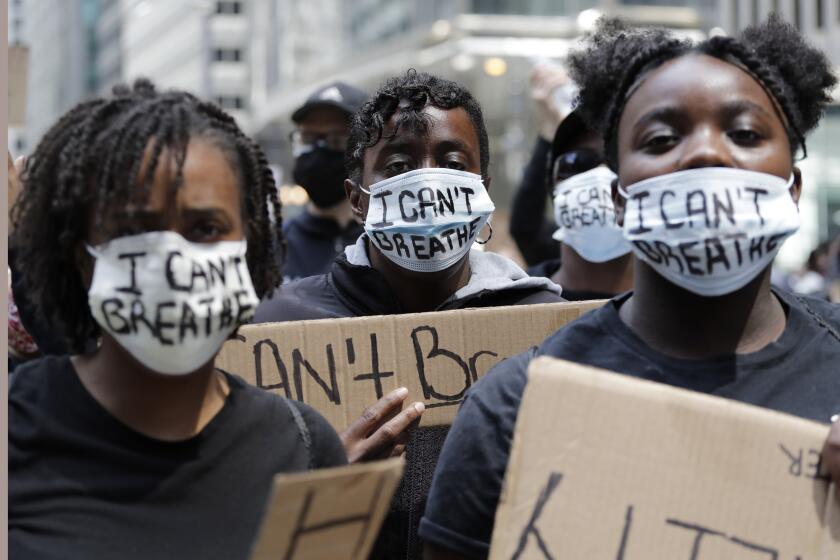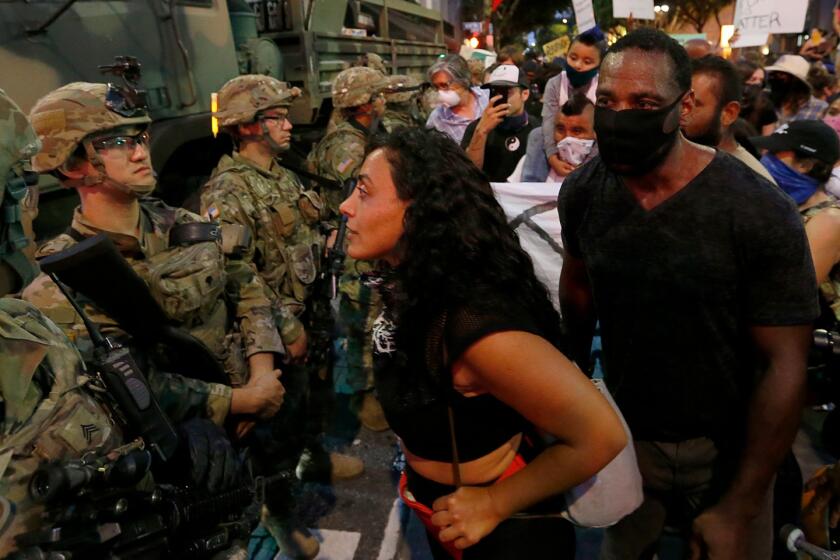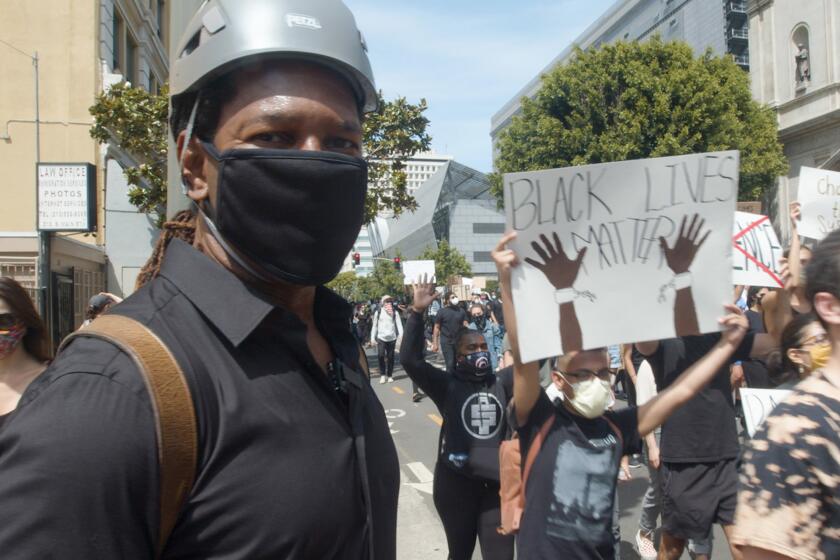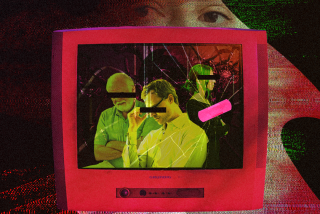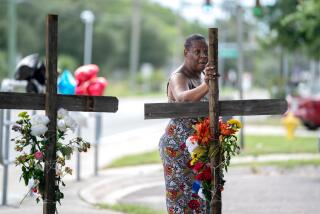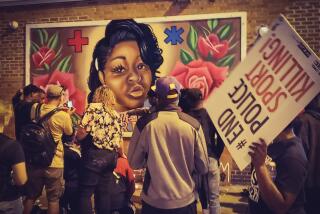Column: We are all horrified, but only white people have the luxury of being shocked
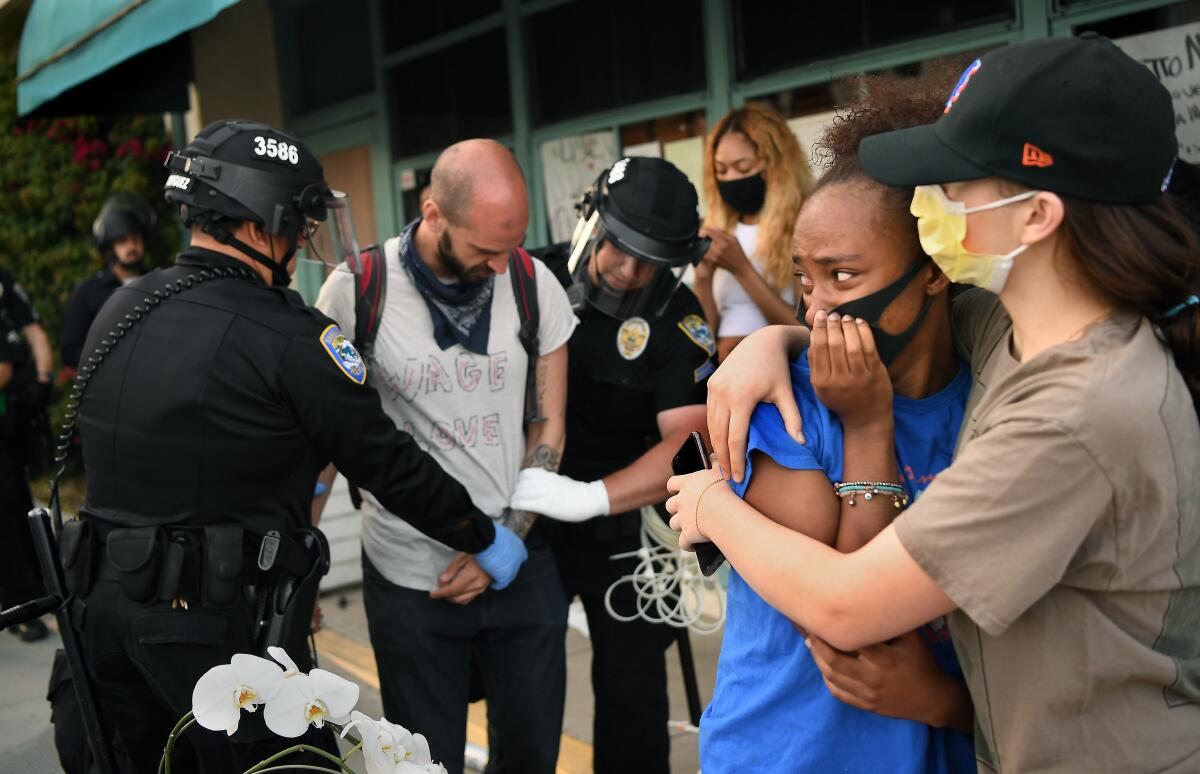
- Share via
Last night while my city burned and curfew fell, I sat and watched “Black Panther” and thought about what smug hypocrites white people can be.
Myself included, of course.
I have spent a lifetime watching cities burn and always over the same damn thing: racism. I am just old enough to remember the 1968 Baltimore riot, one of several violent protests that followed the assassination of Martin Luther King Jr. I remember it mainly because the curfew extended to my family’s suburban neighborhood, which meant I could not play in the yard as long as I wanted to do, something I found extremely unfair.
A reasonable reaction for a 4-year old; not so much for a grown person, though that is the response from far too many white people whenever a city burns for the same damn reason. Including this weekend. It’s so much easier to judge a relatively few looters — my God, not the Grove! — than deal with the fact that the country you live in would rather regularly set itself on fire than address its obvious racism.
Even during a global pandemic. Think about that for a second. How furious do people have to be to gather in the streets at a time when a highly infectious disease is killing thousands daily, especially black and brown people, who are dying at disproportionately high rate?
Pretty damn furious.
We know why: A black man died in the custody of Minneapolis police — for the horrifying offense of attempting to pass a fake $20 bill — while three of his fellow officers looked on. And the only reason any action was taken by the city’s Police Department was that the whole thing was captured on video and circulated on social media.
Which is also why Gregory and Travis McMichael were recently arrested after stalking and shooting Ahmaud Arbery, a black man who had the temerity to take a run in a predominantly white Georgia neighborhood. And no doubt the only reason Christian Cooper wasn’t arrested when a white woman called the cops to say “an African American man” was threatening her (after he asked her to leash her dog in a leash-only section of Central Park) was that he had filmed the whole incident.
The main concern of black people right now isn’t whether they’re standing three or six feet apart, but whether their sons, husbands, brothers and fathers will be murdered by cops.
Seriously, if cellphones turn out to be what saves the soul of America, it will only be what we deserve.
Certainly this is a theme of “Black Panther” — that technology, used in pursuit of equality and justice, can be the great leveler. But that’s not why I was watching it as Los Angeles, and Minneapolis, and Philadelphia, and New York and a dozen other cities, burned.
I was watching because I wanted to remind myself of all the white people who fell all over themselves talking about how wonderful a movie it is — just as we had fallen all over ourselves celebrating “Get Out” the year before.
It was literally the least we could do — praise two very good films — and yet we made such a big deal out of it. Look, white people can enjoy a film with an all-black cast about black empowerment! Look, white people can laugh uncomfortably as the various levels of racism are exposed in a comedy in which all the white people are evil! We are not racists! We paid lots of money to see “Hamilton,” live-tweeted “Scandal,” we supported #OscarsSoWhite. Everyone agrees that Idris Elba is the best-looking man ever, even in “Cats,” and Beyoncé should have won those Grammys because she is a queen.
In L.A., we all mourned the death of Kobe and Gianna Bryant with a depth and ceremony usually reserved for presidents. So it’s getting better, right? We aren’t so racist. We’re getting better, it’s all going to be OK.
Nothing like white people managing their own comfort level while black people continue to deal with the crap they’ve been dealing with for centuries.
And I’m just as bad as any. I’ve championed diversity in film and television and felt very noble, and occasionally, briefly, frightened, when my inbox filled with often threatening hate mail. Look at me, doing the right thing! I’ve tried to support black and brown colleagues, sometimes succeeding, and sometimes failing because I couldn’t understand what the problem was.
Except sometimes I did understand what the problem was. I just didn’t have the energy, or creativity, or intestinal fortitude to deal with it effectively.
Get live updates from Los Angeles Times journalists as they report on protests across the U.S. after the death of George Floyd while in police custody.
I am shocked and horrified by George Floyd’s death and Arbery’s death — and how Amy Cooper’s reaction to a perfectly reasonable request immediately exploded straight to racism so obvious and absurd it would have been funny if we didn’t all know that the story could have ended a whole other way. With Christian Cooper in custody. Or dead. For asking a white woman to leash her dog.
We are all horrified, but only white people have the luxury of being shocked.
Being white does not guarantee fair treatment by the police — just ask countless white rape victims — any more than being white is an automatic protection against COVID-19 or poverty or injustice. But white people do not live our lives in constant, thrumming low- to high-grade fear of the police. We do not worry about getting arrested or killed for being in the wrong neighborhood or because a white person committed a crime and we look like him because we too are white.
We don’t worry about being pulled over or asked for ID for no apparent reason, or threatened with a drawn gun when we ask “What is this about?”
White people do not worry that any chance encounter with the police could easily end with us, or our children, incarcerated or dead.
And we are, or should be, very aware of this. God knows, police harassment of black people has become so normalized it is part of the popular culture. How many jokes/episodes/films/songs have depicted an act of institutionalized racism? How often have white people sat, full of righteous indignation, through stories — scripted and personal — of black men being asked what they’re doing in a “nice” neighborhood or driving an expensive car, or of a white person being pulled over for speeding, only to be asked if he or she is all right when the officer sees that the person in the passenger seat is black?
How many times have we heard a black man say “It’s fine,” while he reaches for his ID and tries to calm us down because we, being white, are allowed the luxury of being furious at a clear example of racism.
Actually, for white people the real luxury is that the outrage can pass, or hover at the farthest edge of everyday life. Because it is not part of our everyday life.
Except it is. We cannot divorce ourselves from injustice simply because it is not happening at any given moment in front of our very own selves. Not only is that the very definition of “morally bankrupt,” it’s just plain wrong. Everything that happens, happens to all of us. Look at the news. Our cities are burning, in the middle of a pandemic, just like they have burned so many times before because systemic, continual injustice is at absolute odds with a peaceful society.
Thousands of demonstrators swarmed the Fairfax District on Saturday, protesting the killing of George Floyd in Minneapolis.
Murder will out. The people will rise. If evolution is too slow, revolution will occur.
We know this. Never mind history. Look at the stories we tell ourselves in literature, film, television, music — justice will prevail, and when it doesn’t, the world is a bleak and dangerous place.
So it isn’t enough for white people to wear “Black Panther” T-shirts and say “Wakanda Forever,” it isn’t enough to tweet a hashtag or sign a petition or show up for a march if once the fires burn out we all go back to our “normal” lives. “Normal” is the problem. “Normal” is what needs to be changed.
I’m not going to tell you how white people can help fix this — everyone knows what to do when they want something changed. Listen to community leaders, vote, show up at meetings, demand accountability, protest, boycott and don’t stop until something gets done. Nobody complains better than white people — just ask any city that has tried to put a Metro line or a homeless shelter in a “nice” neighborhood. Suddenly Karen is on the line, pissed off and demanding to speak with her Congress rep.
Ah, Karen. Lately we’ve heard a lot about Karen, a label for white women (and occasionally men) who call the cops or the manager or otherwise hassle people, usually black or brown, for doing perfectly harmless things that these women find outrageous. Women named Karen, and husbands of women named Karen, are pretty annoyed by this — The Times just got a slew of letters about how unfair the trope is to actual Karens everywhere.
Which just proves my point.
Any group of people who can be moved to protest such an innocuous thing with such vehemence is a resource we need. Instead of criticizing what you consider the “demonizing of a perfectly good name” (as someone named Mary — as in Typhoid Mary — I promise, you’ll live), why not criticize the behavior that the name has come to represent.
Why not use those Karen powers for good?
Be a Karen for change. Don’t demand that the government and the cops put a stop to those horrible protests; demand that they put a stop to the behavior and crimes that led to the protests in the first place. Demand body cams and accountability, demand better training and a zero-tolerance policy, demand that racist cops get fired, abusive cops get prosecuted and good cops get recognized and rewarded. It’s that simple.
Because you know what no one protests against, peacefully or violently? Justice and equality and freedom. Give people justice, equality and freedom and they will stay at home and watch “Black Panther,” which really is a terrific movie.
But if white people want to go around saying “Wakanda Forever,” then we have to be Wakanda. Right now.
More to Read
The biggest entertainment stories
Get our big stories about Hollywood, film, television, music, arts, culture and more right in your inbox as soon as they publish.
You may occasionally receive promotional content from the Los Angeles Times.
